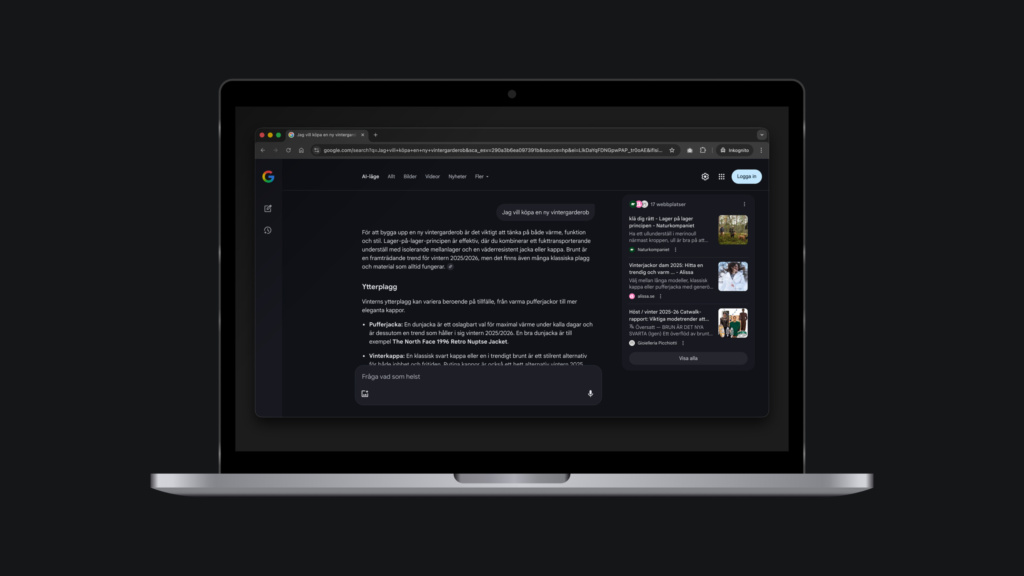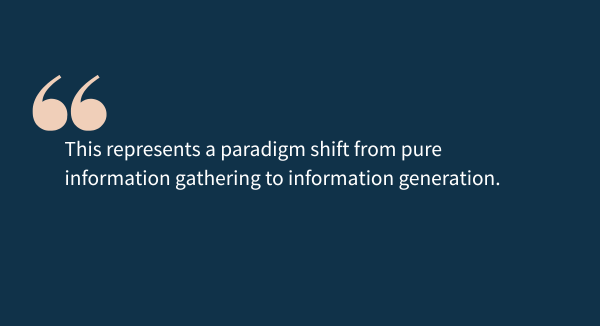SEO 2.0 – How to survive (and thrive) in the new reality of AI search

Does your SEO strategy already seem… outdated? In a short span, Google’s AI search has changed the rules for SEO. In today’s world of AI-driven searches, data-driven insights, automation, and creativity are becoming crucial for reaching and engaging your target audience.
Our customers can clearly see the effects of a changing search landscape. First of all, it’s about less organic traffic despite the same amount of effort, a lower click rate when the results immediately appear in search results, fewer clicks on Google’s front page, and metrics that previously worked suddenly needing to be reevaluated. Sound familiar?
In this article, we’ll examine how AI search works and provide some practical strategies for surviving – and thriving – in this new landscape.


AI search: What is it and why is it changing everything?
In a short time, AI has gone from prediction to reality – and it’s literally changing everything. AI tools have quickly transitioned into a normal part of the workplace. New technologies provide both incredible possibilities and new challenges. In order to stand out from the crowd, we must find the right balance between innovation, analysis and strategy.
Rather than analysing or gathering existing content, generative AI is about creating new content – from the ground up. This is typically achieved through large language models (LLM), which are trained with enormous amounts of data so they can understand language and context – and then generate relevant text.
Within search engines, such as Google’s SGE (Search Generative Experience), generative AI is used to synthesise information from various sources and present it as either a comprehensive, direct answer or an “AI Overview”. Instead of simply presenting a list of relevant links, the AI interprets the user’s intention and constructs an answer. The goal is to immediately answer complex questions, reduce the need to click further (zero-click searches) and provide a more conversational user experience directly within the search results. This represents a paradigm shift from pure information gathering to information generation.
How SEO changes when AI takes over
SEO has never been a static discipline – but with AI as a catalyst, the rate of change has been kicked into overdrive. Thanks to AI, search engines now understand and interpret user intentions on a deeper level, which means we have to abandon traditional SEO models and start thinking in a new way. Those who are willing to combine creativity with smart technology while constantly reevaluating their strategies will be in the strongest position each time the landscape changes.
At the same time, the search results themselves are fundamentally changing.
Powered by AI, Google and other search engines provide completely new kinds of answers, where the aim is to give the user the most relevant information – direct, summarised and often sufficient enough that the user doesn’t even need to leave the results page.
We’re seeing more and more AI-generated answers, summaries, and direct solutions in the top search results – making the competition for visibility tougher. As a result, SEO is no longer about appearing on the page, but rather about creating content that is useful enough to be the basis for the actual answers.
For your business, this basically means that a top position no longer guarantees clicks. Even well-optimised sites can lose a lot of visibility when AI answers “take over” the top space in search engine results. It means that today’s SEO is as much about understanding how AI presents your content as it is about optimising your text – and based on that understanding, adapting your strategy so it continues to drive traffic and engagement to your channels.
AI and Google algorithms: how they influence your content
The development of AI hasn’t just changed what kinds of answers appear in search results – it’s also radically changed how search engine algorithms work. Today, search engines like Google use AI to analyse and understand content in depth, meaning that they can interpret both context and user intention in a way that was previously unimaginable.
For those who work with content creation, this means that it is no longer enough to optimise for keywords or amount of content. Now the material has to be relevant, well-made and useful enough to 1. rank high and 2. be directly used by the AI in its response to the user’s search. To understand how AI-based algorithms function and then adapt strategies accordingly is therefore crucial for ensuring visibility in the new search environment.
Simply put, to maintain the same strategy that worked well a few months ago means that your business risks gradually losing visibility – not because the content has become worse, but because AI has radically changed the search results.

5 tips for visibility in AI-powered search engines
Success requires both new ways of thinking and the willingness to try new ways of working. Here are five concrete tips to help you convert AI insights to effective SEO and position your content where it really makes a difference:
- Optimise the structure of your websites with headlines, bulleted lists and clear answers to facilitate summaries.
- Use AI tools to identify new trends and search intentions so you can stay one step ahead and react proactively.
- Produce more relevant material that responds to users’ actual questions and adds depth, rather than simply attracting visitors without also encouraging them to stay and interact with the website. This, in turn, results in a better user experience and higher ranking in search engines, making it more probable that your content becomes the basis for AI-generated answers and maintains traffic even when search behaviour changes.
- Concentrate on quality over quantity – your content needs to be usable, believable and relevant in order to be prioritised by both algorithms and users.
- Regularly measure and analyse results and be prepared to adjust your strategy and format as AI’s role in searches evolves.
FAQ: Frequently Asked Questions about AI and SEO
How does AI influence search engine optimisation (SEO)?
AI is fundamentally changing SEO by making search engines assess content based on an understanding of user intent, context and relevance – not just keywords. This requires quality, clarity and strategic marketing.
Do I need to adapt my SEO strategy for AI?
Yes, today’s SEO requires you to develop content that is deep, useful and structured to be accessible to AI-generated answers and summaries. Regularly reevaluate and update your strategy, tools and format.
What are the most important things to consider when AI controls search results?
Focus on meeting real questions and needs, optimise for clarity and user value, while benefiting from AI tools to keep yourself updated about trends and changes in search behaviour.
How do I get started with AI-driven tools for SEO?
Start small: Try AI tools for keyword research, competitor analysis and content optimisation. Learn how to analyse the results and integrate your insights into your work processes.
Changes in organic traffic
This shift shows that visibility is no longer only about traditional search engines. As AI-based search tools change, so do the paths to your website. For businesses, this means understanding how content is picked up and presented within these new parameters – and adapting your strategy accordingly in order to stay visible in the places your target group is searching.
Keeping in step with this fast evolution requires thinking differently: future winners in an AI-driven search environment are those that see AI as a way to increased relevance, closer customer relations and improved business for those who dare to rethink their ways of working.
Are you ready to take the next step?
Get in touch for help navigating the new search landscape!